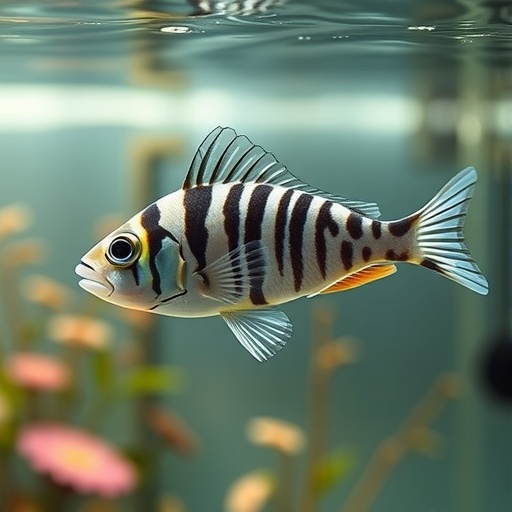In a groundbreaking study published in the journal BMC Neuroscience, a team of researchers led by Koets and colleagues delves into the intricate relationship between risk-taking behavior and coping styles in zebrafish. This significant research sheds light on how these aquatic models, often used in behavioral studies, exhibit both consistent and heritable traits related to their coping mechanisms. The findings have profound implications not only for understanding animal behavior but also for exploring the genetic and environmental factors that influence psychological resilience.
The study identifies a critical connection between the propensity for risk-taking and the coping styles exhibited by zebrafish. By categorizing these fish based on their behavioral responses to challenges and threats, the researchers sought to establish whether there exists a genetic underpinning to these behaviors. This inquiry into coping styles is pivotal; it reveals how certain traits can be passed down through generations, which may play a vital role in the survival of individuals in varying environments.
Zebrafish are increasingly used in various areas of biological research because of their transparent embryos and rapid development cycle, making them ideal for observing behavioral patterns. This particular research employed a series of behavioral assays designed to stimulate risk-taking scenarios, thereby allowing the researchers to observe and record responses in a controlled setting. The innovation in experimental design ensured that responses could be reliably categorized and quantified, thereby leading to more robust conclusions.
The researchers not only focused on immediate behavioral responses but also examined long-term coping strategies adopted by zebrafish. This dual approach was instrumental in highlighting the significant correlations between risk-taking behaviors and the subsequent coping styles developed. The findings suggest that zebrafish exhibiting higher risk-taking tendencies tend to adopt particular, consistent coping strategies that reflect their encounters with challenges.
What makes this research particularly fascinating is the heritable nature of these behaviors. By analyzing the offspring of zebrafish that displayed distinct risk-taking traits, the study found that these offspring also exhibited similar behaviors, suggesting a genetic component. This observation opens a new avenue for understanding the interplay between genetics and behavior, which could have broader implications for studies related to human psychology and behavior.
Furthermore, the researchers postulate that these consistent coping styles may serve as a framework for resilience in zebrafish. For instance, fish that consistently adopt proactive coping strategies may be better equipped to deal with environmental stressors, thus improving their survival rates in the wild. This perspective is crucial, as it provides insights into how animals, including humans, might flourish or falter depending on their coping mechanisms.
The implications of this research extend beyond the zebrafish model itself. By establishing a clear link between risk-taking behaviors and coping styles, the findings could inform future research into other species, including mammals. Understanding how these traits can be influenced or modified could lead to advancements in behavioral science, particularly in addressing issues related to mental health and resilience in stressful environments.
Moreover, the genetic approach taken by the researchers paves the way for future genetic studies. Identifying specific genes associated with risk-taking behaviors could facilitate the development of interventions tailored towards ameliorating detrimental effects associated with high-risk behaviors in various species. This approach could ultimately enhance behavioral therapies designed for humans, particularly those affected by anxiety and depression.
In the context of adaptive behavior, the research emphasizes the importance of risk assessment in the decision-making processes of zebrafish. Evaluating potential risks allows these aquatic animals to navigate their environments more effectively, leading to better-resource-pooling and, ultimately, enhanced reproductive success. This behavior might not only be observed in zebrafish but could also be a prevalent theme across the animal kingdom, highlighting an evolutionary strategy to cope with environmental uncertainties.
The implications of the findings also resonate within the broader scope of evolutionary biology. Understanding how behaviors are inherited and expressed is central to the discussions around natural selection and survival. The emphasis on consistent coping styles provides a unique framework for analyzing how certain traits are favored over others in various ecological niches. This research could thereby enrich the discourse on phenotypic plasticity and behavioral evolution.
By sharing these insights into the world of zebrafish, this study serves as an invitation for further exploration into the genetic and environmental intricacies of behavior. It encourages the scientific community to leverage the zebrafish model to investigate various questions surrounding animal psychology and genetics. With the growing importance of studies on behavioral evolution, this research could set the stage for transformative discoveries in both animal and human psychology.
In conclusion, the connection drawn between risk-taking behaviors and coping styles in zebrafish not only advances our understanding of these fascinating creatures but also poses significant implications for psychological research. By employing innovative methodologies and emphasizing the heritable nature of these traits, Koets and colleagues have opened a new line of inquiry that could resonate far beyond the aquatic laboratory. The long-held question of how behaviors evolve and are passed through generations stands to benefit immensely from such rigorous research.
As we move forward, the challenge remains to translate these findings from zebrafish to more complex mammalian systems. Understanding the genetic and environmental factors that contribute to behavior in these aquatic models provides a stepping stone toward unraveling the complexities of behavioral psychology in higher-order animals. The journey through this blending of genetics and behavior promises not only to further enrich our scientific explorations but also to enhance the welfare of both human and non-human animals residing in increasingly variable environments.
Subject of Research: Risk-taking behavior and coping styles in zebrafish.
Article Title: Risk taking behaviour predicts consistent and heritable coping styles in zebrafish.
Article References: Koets, L., van der Kwaak, T., Schaaf, M. et al. Risk taking behaviour predicts consistent and heritable coping styles in zebrafish. BMC Neurosci 26, 25 (2025). https://doi.org/10.1186/s12868-025-00944-w
Image Credits: AI Generated
DOI: 10.1186/s12868-025-00944-w
Keywords: zebrafish, risk-taking behavior, coping styles, heritability, genetics, behavior, evolution, psychological resilience.




